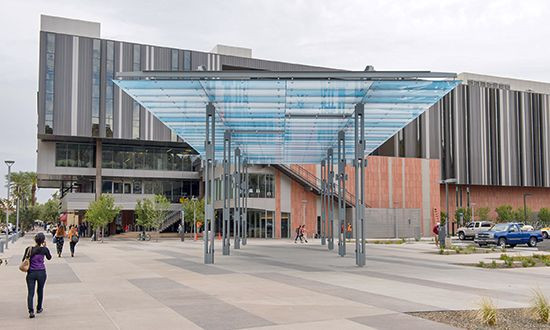Arizona State University, EdX To Offer Full Freshman Year Curriculum Online

Arizona State University (ASU) announced on Wednesday that it would begin offering a full freshman year curriculum online to the public in partnership with edX, a nonprofit which hosts massive open online courses (MOOCs).
The university's new program called the Global Freshman Academy will charge $200 per credit, or about $4,800 for a year, which is significantly cheaper than average costs for four-year colleges. Students will not have to pay until they complete the courses, which will be available worldwide without any admission process. After successful completion of the course, students can apply for admission to the university as sophomores.
“Leave your G.P.A., your SATs, your recommendations at home,” edX CEO Anant Agarwal said, according to the New York Times. “If you have the will to learn, just bring your Internet connection and yourself, and you can get a year of college credit.”
The program, Agarwal told the Inside Higher Ed, would greatly benefit high school students complete general educational requirements before starting college or help international students looking for a future education in the United States.
Although MOOCs have grown in popularity since 2012, they are largely not considered eligible for credit at most major institutions. While some colleges have offered MOOCs or other online class content, these have generally been supplementary, and not a core part of the degree requirements.
A 2013 study found that most MOOC learners already have undergraduate degrees and don’t consider their courses useful for formal education. The American Council on Education (ACE) has evaluated specific MOOCs to recommend them for credit worthiness, but Assistant Vice President Deborah Seymour told the Wall Street Journal that few students have asked for college credits for the classes. “That experiment never really scaled for us,” she said.
Last year, Arizona State University announced a partnership with Starbucks to offer the company's employees the opportunity to earn college credits through ASU’s online courses for free. Earlier this April, it expanded that program to cover the cost of an entire bachelor’s degree.
ASU officials said they’re not worried that the online classes will lower enrolment at the university’s regular offerings. “People always worry about cannibalizing the current population of students,” Philip Regier, ASU dean for educational initiatives, told Inside Higher Ed. “The way we’re thinking about it is we’re making the whole pie bigger. It’s not as though the pie is a fixed size and we’re taking larger and larger slices out of it.”
ASU is among the few universities that did not rush to offer open online courses on platforms such as edX and Coursera. “We were not big believers in MOOCs without credit, courses without a connection to degrees, so we focused our attention on building degree programs,” ASU President Michael Crow told the Times. The university has 13,000 online students pursuing 70 degrees, Crow added.
© Copyright IBTimes 2025. All rights reserved.





















